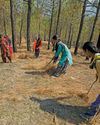
SUKHVINDER SINGH is a worried man. Gazing at the standing lush green paddy crop on his family’s 20 hectare (ha) farmland, the 29-year-old farmer of Punjab’s Bhaini Mehraj village says, “The soil is nearly barren. On its own, it has lost the capacity to yield a crop that can fetch us a good price. We keep it alive with chemical fertilisers.” Sukhvinder’s 60-year-old father Kewal Singh has accompanied him to the field. He used to tend to the same land before his son. “Around 25 years ago, the soil in our district Barnala teemed with life—from earthworms to beetles. Chemicals finished them,” Kewal says.
As per the nutrient dashboard of Union Ministry of Agriculture and Farmers Welfare, the percentage of soil high in organic carbon in Punjab is just 6.9 per cent in 2024-25, down from 12.7 per cent in 2023-24, while the national average stands at 17.9 per cent. “This happened because the soil’s ability to absorb carbon has deteriorated to a great extent. The result is a loss of soil structure, stability and aggregation,” says Umendra Dutt, founding member and executive director of Kheti Virasat Mission (KVM), a Punjab-based non-profit. In April, kvm tested soils from four districts— Moga, Patiala, Faridkot and Bathinda—and found that the average soil organic carbon was just 0.3-0.8 per cent. It should be 1.5-2 per cent.
Poor soil microbial activity has caused a decline of mycorrhiza—a type of fungi—in the soil. Its role in the soil is to help plant roots absorb more nutrients. “Mycorrhiza converts nitrogen into ammonium, which plants can absorb and use. If the field does not have fungi or necessary bacteria, then no matter how much fertiliser you use, the plant will not absorb it to the required extent,” says Gulab Singh of Tapa village, who got his farm soil tested by Punjab Agricultural University in 2022.
This story is from the {{IssueName}} edition of {{MagazineName}}.
Start your 7-day Magzter GOLD free trial to access thousands of curated premium stories, and 9,000+ magazines and newspapers.
Already a subscriber ? Sign In
This story is from the {{IssueName}} edition of {{MagazineName}}.
Start your 7-day Magzter GOLD free trial to access thousands of curated premium stories, and 9,000+ magazines and newspapers.
Already a subscriber? Sign In

THE CIRCULARITY ARGUMENT
A circular economy can help India achieve its developmental aspirations while following the low-carbon pathway. It will also help address the challenges of waste management, pollution and overexploitation of natural resources. Industries are already innovating to reuse high-volume wastes and have shown that the transition can usher in both environmental and financial windfalls

Banking on flawed drug voluntary licences
The Medicines Patent Pool is pushing for more VLs, but its bad deal with Novartis on a cancer drug shows the pitfalls

Lasting solutions
For the first time, the UN has recognised the role of indigenous communities in tackling aridity. A repository of traditional knowledge India has the wherewithal to lead the way

IMD at 150
India's journey into modern weather forecasting took a decisive turn 150 years ago with the establishment of India Meteorological Department during the British rule. The agency has come a long way since then, shaping the way the country predicts and responds to its diverse climate challenges

Every drop counts
In drought-prone Marathwada region, 14 villages have managed to counter water shortage by budgeting the resource

Threat to survival
Hollongapar Gibbon Sanctuary in Assam faces ecological challenges as railway electrification and hydrocarbon exploration endanger its fragile biodiversity

'Migration is going to be a battlefield'
AMITAV GHOSH is one of the foremost chroniclers of our times. His literary sojourn includes writings on topics that range from languages to climate change to human lives. His latest book, Wild Fictions, brings some of his works on these issues under one title. In a conversation with RAJAT GHAI, Ghosh shares his views on the future of human movement. Excerpts:

Face of future
California wildfires confirm forest fires are intensifying in a hotter world, emitting substantial amounts of greenhouse gases and reinforcing global warming

Friends of the forest
Residents of 30 villages in Uttarakhand establish a model for public participation in saving forests from wildfires

Climate-crazy playbook
Just hours after his second (and final) term began on January 20, US President Donald Trump unleashed 46 presidential actions. Several of these are centred on the US' climate commitments, energy transition, migration and trade policies, and are likely to have negative global implications